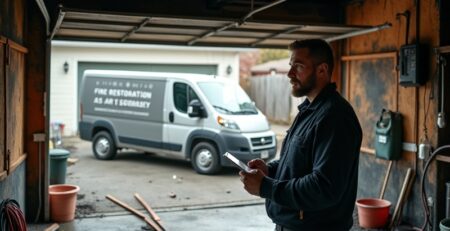Tips for Managing Stress After Home Damage
**Tips for Managing Stress After Home Damage** can be invaluable for homeowners facing the aftermath of unexpected disasters. Have you ever felt overwhelmed after experiencing damage to your home? The emotional toll can be just as significant as the physical repairs needed, making it essential to find effective strategies to cope with stress during this challenging time.
In this article, we will explore practical tips to help you manage stress after home damage, including seeking professional assistance, establishing a support network, and practicing self-care. Experts emphasize the importance of addressing both the physical and emotional aspects of recovery to ensure a smoother transition back to normalcy. By implementing these strategies, you can regain control and foster resilience in the face of adversity.
But these tips are just the beginning of your journey to recovery. As you navigate the complexities of restoration, remember that you don’t have to do it alone. Let’s dive deeper into the essential steps you can take to manage stress effectively and restore peace to your home and life.
Understanding the Impact of Home Damage on Mental Health
Home damage can significantly elevate stress and anxiety levels. When a home suffers damage, it disrupts the sense of safety and stability. This disruption can lead to feelings of vulnerability and helplessness. Losing a safe space often triggers emotional distress, as individuals may feel exposed to external threats. Consequently, the psychological toll can be profound.
Studies indicate that individuals experiencing home damage report higher rates of anxiety and depression. For instance, a survey found that 60% of homeowners felt increased stress after property damage. Furthermore, the American Psychological Association highlights that the loss of a secure environment can lead to long-term mental health issues.
Restoring a damaged home is not just about physical repairs; it’s also about healing emotional wounds. Engaging with professionals can help ease the burden. For more information on how to address these challenges, visit our services page. Additionally, understanding the restoration process can provide peace of mind. Explore our projects to see how we help others regain their safe spaces.
Immediate Steps to Take After Home Damage
Upon discovering home damage, your first actions are crucial. Start by ensuring your safety and the safety of others. If you notice structural damage, evacuate immediately. Next, turn off utilities to prevent further hazards. This includes gas, electricity, and water. After securing the area, document the damage with photos for insurance purposes.
Create a checklist to guide your actions. First, assess the extent of the damage. Then, secure any openings to prevent further exposure to the elements. Use tarps or boards as temporary fixes. Additionally, check for any potential hazards like exposed wires or gas leaks. If you encounter serious issues, do not hesitate to contact emergency services.
It’s vital to reach out to professionals for assistance. They can provide expert advice and help mitigate further damage. For instance, if water damage is present, consider contacting a water cleanup service. Similarly, if mold is a concern, a mold cleanup expert can ensure your home is safe. Taking these immediate steps can significantly reduce stress and facilitate recovery.
Assessing the Damage and Creating a Recovery Plan
Assessing the damage after a home incident is crucial for effective recovery. Start by walking through your property, noting visible issues. Look for structural damage, water stains, or mold growth. Use a camera to document everything. This visual record will support your insurance claims later.
Next, prioritize repairs based on urgency. Address safety hazards first, such as exposed wires or unstable walls. Then, focus on areas that could worsen if left unattended. For instance, water damage can lead to mold, so water cleanup should be a top priority.
Once you have a clear understanding of the damage, create a recovery plan. List all necessary repairs and categorize them by importance. This structured approach helps streamline your efforts. Additionally, keep all receipts and records of repairs. This documentation will be invaluable when filing your insurance claim. For more information on recovery services, visit our services page. Remember, a well-organized plan can significantly reduce stress during this challenging time.
Seeking Professional Help and Support
After experiencing home damage, consulting with professionals is crucial. Contractors can assess the extent of the damage and provide necessary repairs. Additionally, insurance agents help navigate claims, ensuring you receive the support you deserve. Their expertise can significantly reduce stress during this challenging time.
If you find yourself feeling overwhelmed, seeking mental health support is essential. Therapists and counselors can offer coping strategies tailored to your situation. Many communities provide resources for those in need, including hotlines and support groups. Connecting with others who have faced similar challenges can foster a sense of belonging and understanding.
Moreover, local organizations often host workshops and seminars to educate homeowners about recovery processes. These resources can empower you to take control of your situation. For more information on available services, visit our services page. Additionally, consider reaching out through our contact page for personalized assistance. Remember, you are not alone in this journey; support is available.
Coping Strategies for Managing Stress
Coping with stress after home damage requires practical strategies. First, consider incorporating mindfulness techniques into your daily routine. Simple practices like deep breathing or meditation can significantly reduce anxiety. Additionally, regular exercise serves as a powerful stress reliever. Even a short walk can elevate your mood and clear your mind.
Social support plays a crucial role in managing stress. Reach out to friends and family for emotional support. Sharing your feelings can lighten your burden and foster connections. Engaging in conversations with loved ones can provide comfort and perspective during challenging times.
Maintaining a routine also helps restore a sense of normalcy. Set daily goals and stick to a schedule. This structure can create stability amid chaos. Include time for self-care activities, such as reading or hobbies, to nurture your well-being.
For more resources on managing stress, explore our about page. If you need assistance with home restoration, check our services for support. Remember, you are not alone in this journey.
Financial Considerations and Budgeting for Repairs
Creating a budget for repairs and recovery is essential after experiencing home damage. Start by assessing the extent of the damage. List all necessary repairs and estimate their costs. This step helps you understand the financial scope of your recovery. Next, prioritize repairs based on urgency and safety. Allocate funds accordingly to ensure critical issues are addressed first.
Consider exploring financial assistance options. Homeowners insurance may cover some repair costs, so review your policy carefully. Additionally, local and federal grants might be available for disaster recovery. Research these options to ease your financial burden.
Managing financial stress during recovery is crucial. Set realistic expectations for your budget and timeline. Break down large expenses into smaller, manageable payments. This approach can make the financial load feel lighter. Furthermore, maintain open communication with contractors and service providers. This transparency can help avoid unexpected costs.
For more information on recovery services, visit our services page. If you need assistance, don’t hesitate to contact us. We’re here to help you navigate this challenging time.
Long-term Recovery and Home Restoration
Restoring your home after damage is a significant undertaking. First, assess the extent of the damage. This step helps you prioritize repairs and determine what needs immediate attention. Next, engage professionals who specialize in restoration services. They can guide you through the process, ensuring your home becomes livable again.
While repairs are underway, consider making improvements. Upgrading insulation or installing energy-efficient windows can enhance your home’s value. Additionally, this is an excellent opportunity to redesign spaces for better functionality. However, remember that these upgrades may extend the timeline of your recovery.
Patience is crucial during this period. Setting realistic expectations helps alleviate stress. Understand that restoration takes time, and unexpected issues may arise. Communicate openly with your restoration team to stay informed about progress. By doing so, you can maintain a positive outlook and navigate the recovery process more smoothly. Ultimately, your home will not only be restored but may also become a better version of itself.
Preventing Future Damage and Stress
To prevent future damage and stress, regular home maintenance is essential. Start by inspecting your roof and gutters at least twice a year. Clean them to avoid water buildup, which can lead to leaks. Additionally, check your plumbing for leaks and ensure your appliances are in good working order. This proactive approach minimizes the risk of unexpected issues.
Moreover, having an emergency plan in place is crucial. Identify escape routes and establish a communication plan with your family. Keep emergency supplies readily available, including flashlights, batteries, and first aid kits. This preparation can significantly reduce panic during unforeseen events.
Building resilience is equally important. Consider creating a financial safety net to cover unexpected repairs. Engage in community resources, such as local workshops on disaster preparedness. These steps not only enhance your readiness but also foster a sense of security. For more information on how to safeguard your home, visit our services page. Additionally, explore our projects to see how we help others prepare for the unexpected.
Frequently Asked Questions (FAQs)
Managing stress after experiencing home damage can be overwhelming. Many people have questions about how to cope effectively. Here are some common inquiries and their answers.
How can I manage my mental health during recovery? Prioritize self-care. Engage in activities that bring you joy. Additionally, consider talking to a mental health professional for support.
What should I do first after home damage? Start by assessing the situation. Document the damage and contact your insurance provider. This step is crucial for your recovery process.
How can I handle financial concerns? Create a budget to manage expenses. Explore your insurance options and seek assistance from local resources if needed. Understanding your financial responsibilities can alleviate stress.
Is it normal to feel overwhelmed? Yes, feeling overwhelmed is a common reaction. Acknowledge your feelings and reach out for help when necessary. Connecting with others can provide valuable support.
What resources are available for assistance? Many organizations offer help after home damage. Research local services and consider contacting professionals for guidance on recovery. For more information, visit our contact page.
Conclusion and Encouragement
In conclusion, managing stress after home damage requires a proactive approach. First, remember to prioritize self-care and reach out for support. Connecting with friends, family, or professionals can provide much-needed relief. Additionally, take small, manageable steps towards recovery. Focus on one task at a time to avoid feeling overwhelmed.
Moreover, it’s essential to stay informed about the restoration process. Understanding what to expect can alleviate anxiety. For instance, exploring services available can empower you to make informed decisions.
Above all, maintain hope. Recovery is a journey, and every step forward counts. Celebrate small victories along the way. If you find yourself struggling, don’t hesitate to seek help. Professionals can guide you through the process, ensuring you feel supported.
Remember, you are not alone in this. Many have faced similar challenges and emerged stronger. Embrace the support around you and take proactive steps towards rebuilding your home and peace of mind. For more information, visit our about page or reach out through our contact form.










